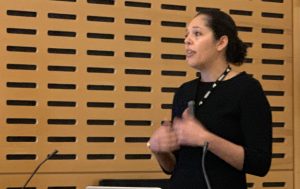Yesterday we had the ‘wash-up’ meeting of the group that plans Women@Imperial week, to review what went well, what not so well, the feedback and responses we got to the various events and what lessons we should carry forward into planning for next year. There’s a nice write-up of the week by Elizabeth Nixon on the College news site.
Overall we were pleased at the participation in the wide range of events that had been organised, whether they were wikithons, lunchtime talks, training sessions or our portraits project. We had a very positive great reaction on social media. There were some concerns about the lack of events on campuses beyond South Kensington – which is a fair point. We will aim to do better on that front next year. If you have ideas about events, please get in touch.
I tried to attend or at least pop in on as many events as I could. I was particularly impressed by the competitors and finalists of the WEinnovate competition and the buzz generated by the Lates event (apparently the organisers had some difficulty getting people to leave at the end of the evening).
However, my personal highlight was the talk by Nadia Soliman, a PhD student in our Faculty of Medicine who used to be in the army. Nadia spoke candidly, passionately and with great insight into her contrasting experiences of how the army and academia train people for leadership positions.

Her talk (now posted on the College YouTube channel) is well worth watching. It’s only about 30 minutes long and is followed by a prolonged Q&A session which shows how well she succeeded in grabbing her audience’s attention.
Nadia, who rose to the rank of captain and did tours of duty as a bomb disposal expert in Afghanistan and Nigeria, showed how much effort the army puts into preparing people for leadership. It wants them not only to be able to recognise their own strengths and weaknesses, but to appreciate the importance of understanding the strengths and weaknesses of the people in the teams that they are to command. She learned from her military training that effective leadership is not simply a matter of barking orders and demanding action, but of knowing how to get the best out of people.
In academia we have gotten a lot better at leadership training over the years. But if I look back on my own career trajectory from PhD student to postdoc to group leader I can see how at many points it was left up to me to figure out management of my research group. And I often got it wrong as a result.
For sure there are many differences between life in the military and the life of an academic, but they are fewer than you might imagine. As Nadia showed, there are valuable lessons to be learned if we are prepared to listen to different perspectives and experiences from our own. As she said in her closing remarks:
“If we invest more in our people, we give our teams better capacity, better capability, if we try to work more in collaboration, […] then we as a community we will achieve more in our research and we will become greater than the sum of our parts.”